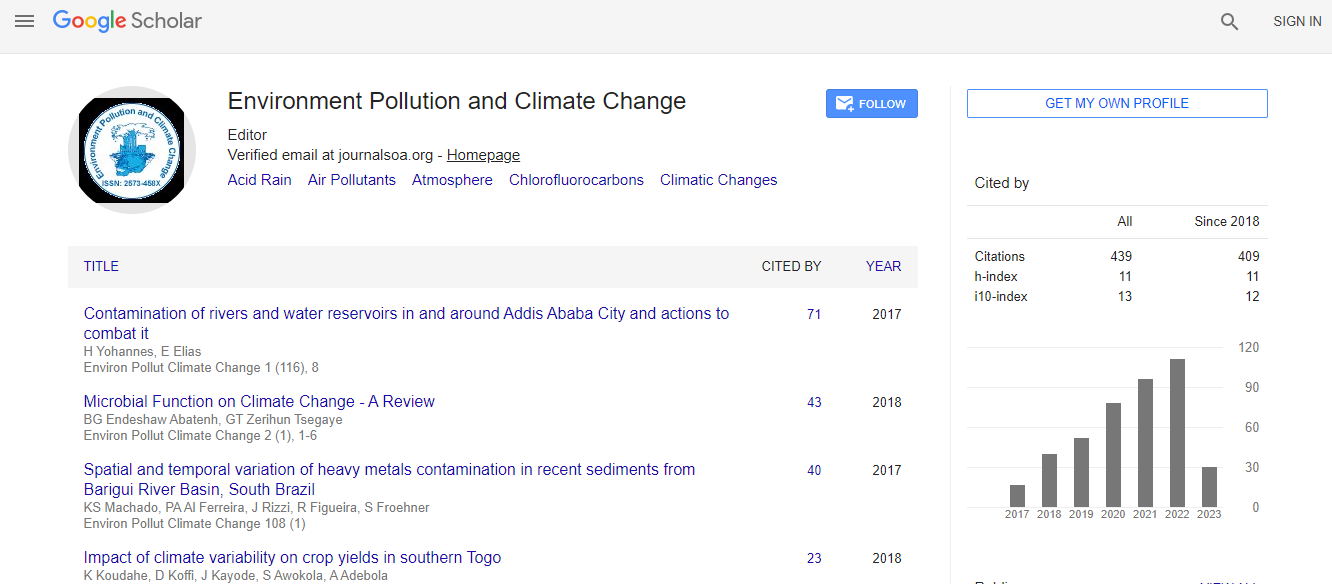Our Group organises 3000+ Global Conferenceseries Events every year across USA, Europe & Asia with support from 1000 more scientific Societies and Publishes 700+ Open Access Journals which contains over 50000 eminent personalities, reputed scientists as editorial board members.
Open Access Journals gaining more Readers and Citations
700 Journals and 15,000,000 Readers Each Journal is getting 25,000+ Readers
Google Scholar citation report
Citations : 431
Environment Pollution and Climate Change received 431 citations as per Google Scholar report
Environment Pollution and Climate Change peer review process verified at publons
Indexed In
- Google Scholar
- Publons
- Euro Pub
- ICMJE
Useful Links
Recommended Journals
Share This Page
Too slow and too difficult? participatory governance as a lever for climate change adaptation
Joint Event on 5th World Conference on Climate Change & 16th Annual Meeting on Environmental Toxicology and Biological Systems
Carolyn (Tally) Palmer
Rhodes University, South Africa
Keynote: Environ Pollut Climate Change
Abstract
Statement of the Problem: Interventions for development, sustainability, and/or climate change adaptation have a history of ambiguous outcomes and outright failures. How can interventions, and especially those that involve government, research and stakeholders, including local residents, result in sustainable outcomes that persist beyond the intervention, and move towards climate change behavior-change in the practice of all participants? Methodology & Theoretical Orientation: The underpinning methodology is transdisciplinary (TD). Critical realism provides a theoretical foundation for discerning causal mechanisms in complex systems using the full range of disciplinary enquiry. The concept of complex social-ecological systems (CSES) provides a lens to forefront the role adaptation and feed-back. Expansive learning provides the mechanisms to guide processes of co-learning and the co-development of knowledge. Strategic adaptive management provides practical on-the-ground steps for stakeholders to participate in an adaptation process. The governance system in each particular CSES provides the contextual possibility of a process that will persist. Participatory governance brings the vitality and relevance of civil society. Eight case studies to probe the challenging question of whether painstaking on-the-ground trust– building; activating participatory governance processes; and engaging in reflexive praxis, can catalyze change towards climate change adaption, specifically focusing on water scarcity. Conclusion & Significance: The selected approach is slow, with many pitfalls. There are not many examples of unequivocal success. However, we can demonstrate learning, begin to understand failure more deeply, and most importantly share “narratives of hope”. Pace of progress and the difficulty of persevering. These “narratives of hope” are the landmarks to encourage perseverance until a bigger body of evidence emerges and principles of practice are refined. We have enough examples of participatory governance being a key lever for ongoing change towards climate change adaptation to suggest it is worth persevering. The approach is easy to criticize – especially in terms of the pace of progress and the difficulty of persevering with these processes. These “narratives of hope” are the landmarks to encourage perseverance until a bigger body of evidence emerges and principles of practice are refined. Recent Publications 1. Palmer C G, Biggs R and Cumming G S (2015) Applied research for enhancing human well-being and environmental stewardship: using complexity thinking in Southern Africa. Ecology and Society 20(1):53. 2. Lang D J, Wiek A, Bermann M, Stauffacher M, Martens P, et al. (2012) Transdisciplinary research in sustainability science: practice, principles, and challenges. Sustainability Science 7(5):25–43. 3. Folke C (2006) Resilience: the emergence of a perspective for social-ecological systems analyses. Global Environmental Change 16(3):253–267. 4. Cilliers P (2000) What can we learn from a theory of complexity? Emergence 2(1):23-33.Biography
Carolyn (Tally) Palmer has a research trajectory from aquatic ecology and environmental water quality, together with water law and policy development, to a commitment to the transformative capacity of engaged, transdisciplinary action research praxis, based on a conceptual faming of complex social-ecological systems. Her concept of Adaptive Integrated Water Resource Management includes the recognition that participatory governance – people at the interface of knowledge production, practice and politics creates a sustainability platform and pathway that can be the foundation of local to at least national scale climate-change adaptation. At the interface of sustainability science, policy, and practice it is practice that most often fails. Carolyn brings a coherent set of transdisciplinary case studies from across South Africa to argue that participatory governance can be a key lever to embed climate change adaptation practice, making the most of linked research and development interventions.
E-mail: tally.palmer@ru.ac.za

 Spanish
Spanish  Chinese
Chinese  Russian
Russian  German
German  French
French  Japanese
Japanese  Portuguese
Portuguese  Hindi
Hindi 
